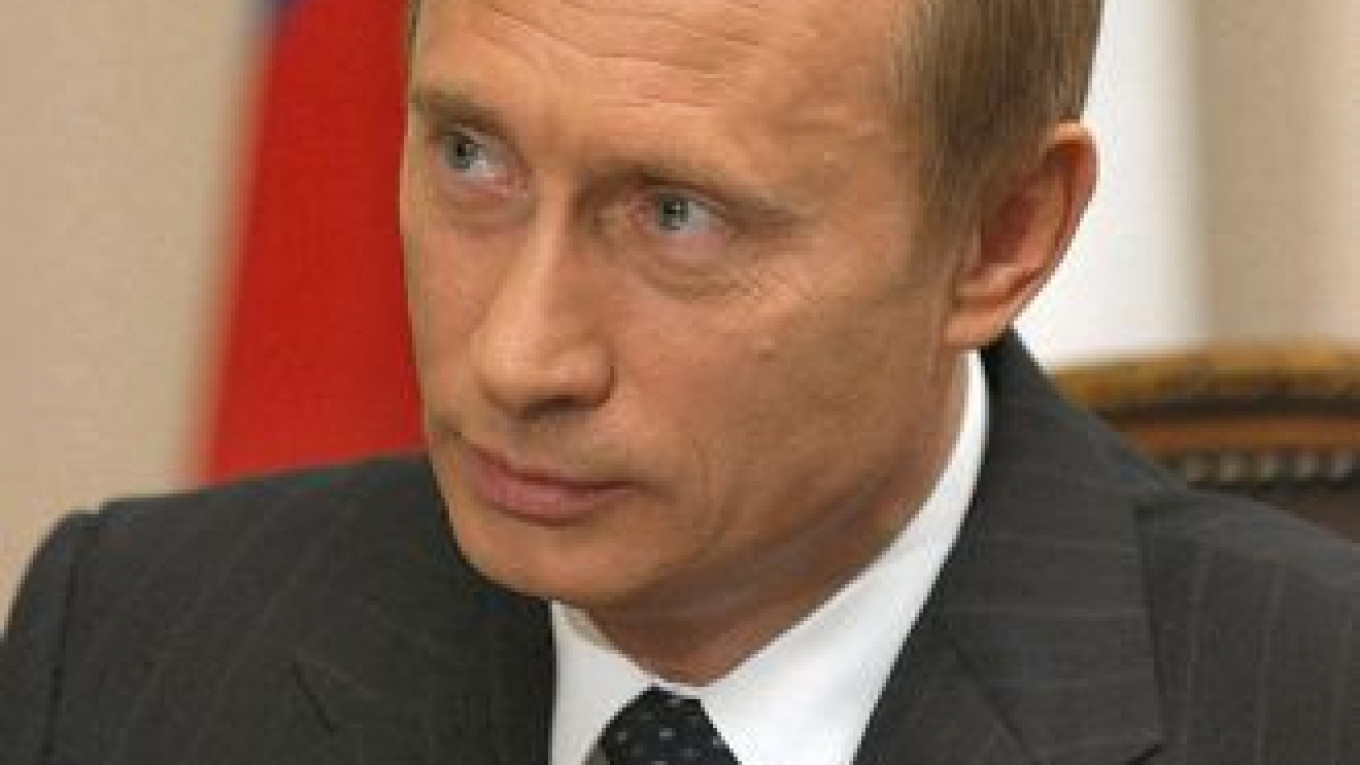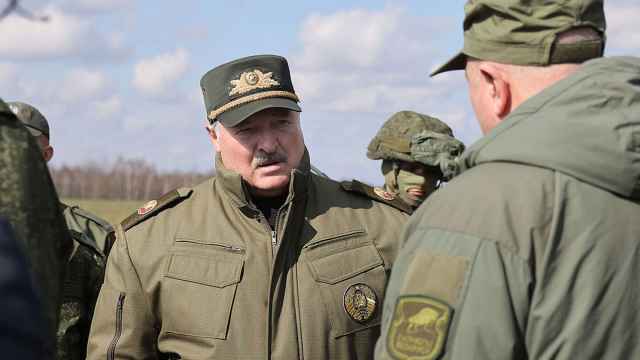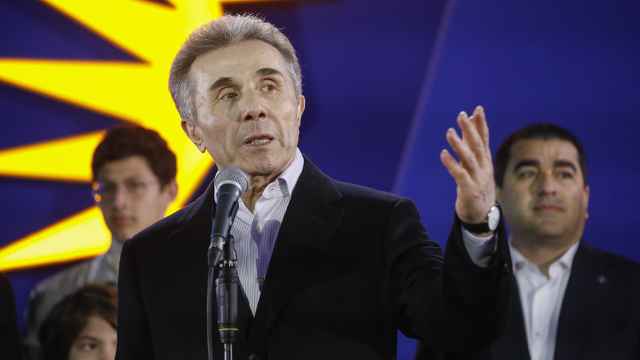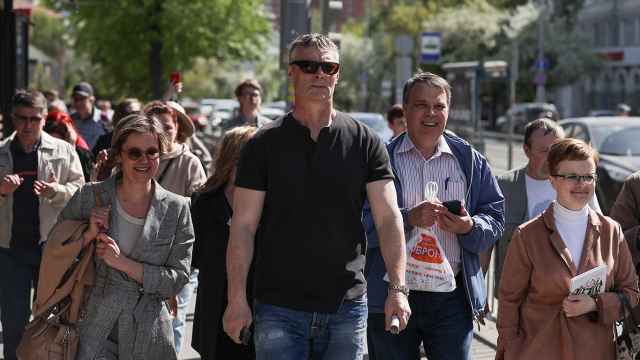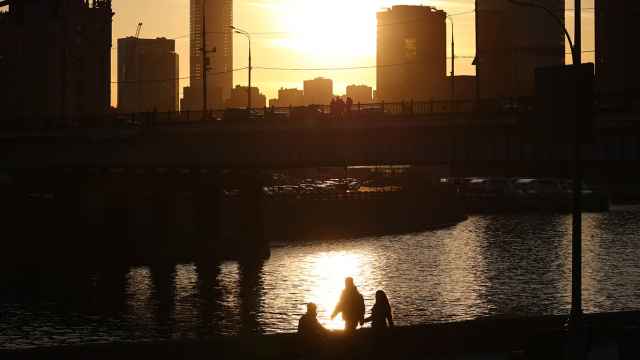A leading rights group lashed out at President Vladimir Putin on Thursday by saying he had “unleashed the worst political crackdown” in the country’s post-Soviet history after returning to the Kremlin last year.
Human Rights Watch’s , released Thursday, says the string of restrictive laws enacted since last summer, as well as the ongoing harassment of Kremlin critics, amount to “the swift reversal of former President Dmitry Medvedev’s few, timid advances on political freedoms.”
“The past year has been the worst year for human rights in Russia in recent memory,” Rachel Denber, the deputy director of the organization’s Europe and Central Asia division, told reporters in Moscow.
Denber said that even though some of the new laws, like the widening of the definition of treason or harsher sanctions against nongovernmental organizations, had not been implemented yet, they already contribute to an atmosphere of fear: “These laws already play a role,” she said.
Human Rights Watch director Ken Roth said the reason for the crackdown was Putin’s fear of a popular uprising against him.
“I do think the motivation here is the fear of the Russian people,” he told reporters in London.
Roth said the harsh laws were “designed to close the space for dissent” as a response to the mass protests against Putin’s return to the Kremlin.
“The series of uprisings clearly panicked Putin,” he said, according to video footage on Human Rights Watch’s web-footage on Human Rights Watch’s website.
The report, which devotes nine of its 680 pages to Russia, also criticizes the prison sentences for members of the Pussy Riot punk group, the legislation banning “homosexual propaganda” as well as restrictive policies that result in the denial of palliative care for the terminally ill.
It also talks at length about the North Caucasus, where adherents to Salafism, a purist form of Islam, are regularly subjected to persecution and torture, because authorities view them as supporting the Islamist insurgency. The report criticizes Chechen leader Ramzan Kadyrov for overseeing a system of collective punishment against insurgents’ relatives and suspected supporters.
The authors also note that the European Court of Human Rights has issued more than 210 rulings against Russia, but that the government only pays the required compensation while it fails to implement the core of the judgements by not conducting effective investigations.
“Instead of meaningfully investigating human rights abuses, the government is spending time and energy retaliating against civil society and free speech,” Hugh Williamson, the group’s Europe and Central Asia director, said in an e-mailed statement.
Human Rights Watch also raised the issue of the Olympic Games in Sochi, criticizing that property from hundreds of local families was expropriated for building venues for the games scheduled for February 2014. While most homeowners were compensated, in many cases amounts were unfair and the process was opaque, the report says.
Neither the government nor the Kremlin responded to the criticism Thursday. Foreign Ministry spokesman Alexander Lukashevich merely said that he had not read the report but that any negative findings would be wrong.
“We will show that the human rights situation is not so bad in Russia,” he told reporters. He added that such accusations usually come from countries that are not ideal either. “Before you criticize others, you ought to look at yourself,” he was quoted as saying by Interfax.
But Human Right Watch’s Williamson refuted Moscow’s regular line of defense that foreigners should not criticize the country’s human rights record.
“The Kremlin cynically conflates legitimate expressions of concerns about human rights and the rule of law with undermining Russia’s sovereignty. But Russia’s international partners should not be bullied into silence,” he said.
He pointed to the European Union for acting ineffectively in the face of rights abuses in the region. The EU “should adopt a common policy … that would bind their approach on human rights and the rule of law in Russia,” he said in the statement.
Human Rights Watch director Roth pointed to Central Asia as a region where the 27-member bloc’s performance in this respect had been disappointing. “The EU dropped the ball on human rights in Central Asia,” he said in London. As an example, he mentioned the lifting of sanctions against Uzbekistan, which he linked to that country’s role as a transit hub for the NATO troop withdrawal from Afghanistan.
Contact the author at n.twickel@imedia.ru
Related articles:
A Message from The Moscow Times:
Dear readers,
We are facing unprecedented challenges. Russia's Prosecutor General's Office has designated The Moscow Times as an "undesirable" organization, criminalizing our work and putting our staff at risk of prosecution. This follows our earlier unjust labeling as a "foreign agent."
These actions are direct attempts to silence independent journalism in Russia. The authorities claim our work "discredits the decisions of the Russian leadership." We see things differently: we strive to provide accurate, unbiased reporting on Russia.
We, the journalists of The Moscow Times, refuse to be silenced. But to continue our work, we need your help.
Your support, no matter how small, makes a world of difference. If you can, please support us monthly starting from just $2. It's quick to set up, and every contribution makes a significant impact.
By supporting The Moscow Times, you're defending open, independent journalism in the face of repression. Thank you for standing with us.
Remind me later.



